When it comes to caring for and understanding donkey behavior, there’s often a misunderstanding that they are similar to horses as they come from the same genus. Due to this understanding, donkeys are seen as stubborn, but this cannot be farther from the truth. Donkeys are also seen as stoic animals who are sometimes hard to read but truth is that they are social animals and can really open up when taken care of with love and warmth. So how do you understand donkey behavior? Stick around till the end to find out.
Donkey behavior: what should we expect?
A Donkey’s behavior can be affected by a multitude of factors—their environment, previous experiences, medical conditions, and more, therefore, it can be hard to say that any of their responses are a direct response to a single stimulus and thus, understanding your donkey and its environment can help you be a good judge of your donkey’s behavior.
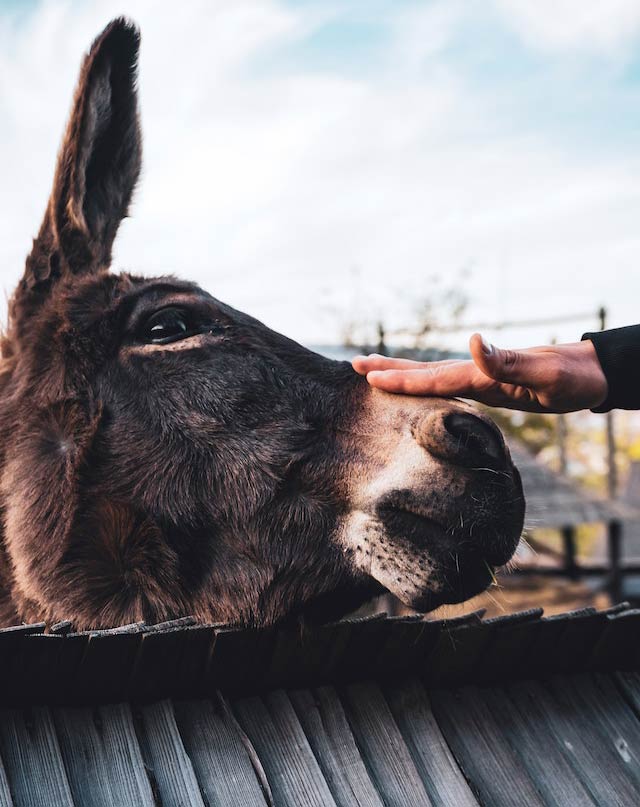
In a paper by Anna Haines and Joanna Goliszek titled, ‘Donkey and mule behavior for the veterinary team’ they explore the difference in behavior of a relaxed donkey and a donkey affected either by stress, fear, or anxiety. In the observations, changes in behavior are minute and easy to miss. For example, a relaxed donkey will have a relaxed and open nose whereas a distressed donkey had its nostrils clamped shut. Whereas with horses, it’s easier to read them as they express themselves far more easily than donkeys. For example, when a horse is irritated, they often display this by stomping their feet whereas a donkey might just clam their nostrils shut which is a harder sign to read.
Donkeys have a strong fight or flight response which causes them to freeze up when in distress. They adopt a standing position when alert or in a resting situation. Standing rest is probably an adaptive donkey behavior since it allows them to flee more promptly from predators even while resting. This behavior tends to give the impression that they are stubborn animals, but they are highly social and loveable creatures that just might be a little less expressive than one may like.
This subtlety in their behavior is what might cause us to sometimes overlook their pain, which might lead us to overwork them and thus form the misconception that they are stubborn. So how do we properly understand a donkey’s behavior? Let’s start with the basics.
Jacks vs Jennies
Male donkeys are called Jacks and female donkeys are called Jennets/ Jennies. They don’t differ greatly from each other, but research published in the journal ‘Applied Animal Behavior Science’ states that male donkeys are more responsive to their environments compared to jennies as seen through their head carriage. They are more interested in their surroundings and are curious to explore, whereas a jenny is not so inclined to the same.
In a study that aimed to identify pain related behavior of donkeys, it showed that biting was more frequently demonstrated by male donkeys while headshaking and licking/chewing were seen more frequently in females.
When it comes to parental behavior and protection, Jennies generally are more affectionate and motherly compared to jacks. This is also what makes them better guard donkeys than jacks.
How do donkeys communicate?
i. Braying
A donkey’s bray is also colloquially called hee-haw. In a bray, a ‘hee’ sound is made when they breathe in and a ‘haw’ sound when they breathe out. But why do donkeys hee-haw?
Originally, donkeys brayed to signal each other about dangers over expansive areas of sparse vegetation where they grazed, but now, domesticated donkeys bray for a multitude of reasons. It’s important to pay heed to them all as a donkey’s bray is an attempt from them to communicate to you.
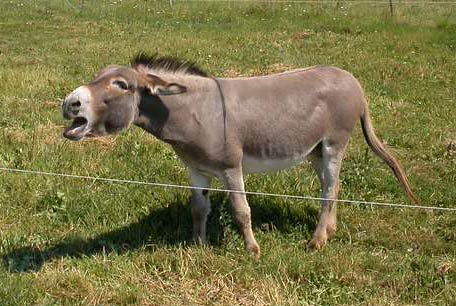
For example, if you step into the farm in the morning and are greeted by a short bray, they’re wishing you a good morning. But if they’re uncomfortable in their environment and are braying in a high-pitched voice, they want you to pay attention and help them solve the issue. A donkey’s braying may not always be a sign for alarm, but a consistent bray is something to pay attention to. Paying attention to your donkey’s bray and its environment can help you not only understand them but form a bond with them as time goes by.
ii. Donkeys showing affection
If you’re thinking of keeping a donkey as a pet and are wondering, does a donkey make a good pet? We’re here to tell you yes, they do.
Donkeys make for very affectionate and playful pets. They are highly intelligent creatures and appreciate being treated gently and with love. They might be hard to get along with in the beginning but once they know they can trust you, they open up to be wonderful companions.
Donkeys being subtle creatures, it can be hard to understand if they are being affectionate or if they are trying to communicate something else to you, so how do donkeys show affection? A first step to donkeys showing affection to you is if they stay close to you, their proximity to you. Donkeys are known to enjoy their space, and so them sharing their space with you is a great way of showing their affection towards you.
After they’ve established a relationship with you and start showing that they like you, they also show affection by approaching you to be petted, following you, nuzzling at you, wrapping their body around you, and possibly blowing air gently through their nose on you.
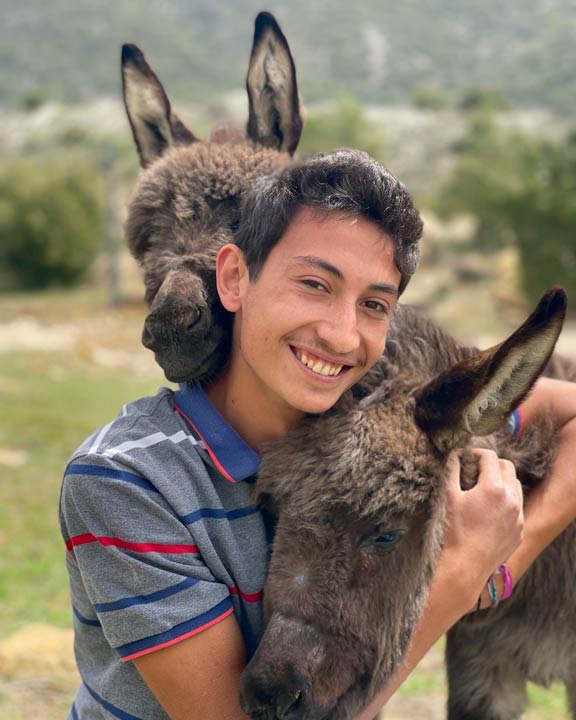
Donkey behavior is affected by a multitude of things, that’s why it’s important to understand donkeys as individuals. Each donkey has a different past and experience with different animals or humans which affect their behavior. Understanding the history of your donkey and being compassionate towards them is a great way of not only getting close to your donkey but also gaining their trust. And trust is an important factor to have any relationship with a donkey as they are highly self-preserving animals who do not engage with unsafe environments.
It’s definitely a process to have a donkey trust you but consistency and patience can go a long way with winning their trust. Firstly, be consistent with their feeding times. Setting this routine helps your donkey know that they will be fed on time and will trust you for it.
Secondly, spend time with them in their vicinity, talk to them, and maintain a calm demeanor. This helps them get comfortable with you around them. Talking to them regularly with a calm tone and body language helps them understand your tone and attitude towards them and when they understand that you are not being aggressive, they will start trusting you more.
Donkeys are tactile animals; they love being petted and enjoy physical interaction. Therefore, once donkeys are comfortable with being around you, you can take actions such as giving them pets and showing them affection.
iii. Donkeys showing discomfort or aggression
They show aggression by either kicking, pawing the ground, or kicking out. If you’ve ever wondered why your donkey is kicking you, they are probably feeling frustrated, threatened, or are in pain about something. Judging by the environment they are in and the situation, you can resolve this issue by removing the irritant.
These signs are an invitation for you to treat them with understanding and love. Donkeys also kick to exhibit dominance over other donkeys in the herd and fight with other donkeys to assert the same. Braying loudly and continuously for a long time also indicate frustration and agitation.
For example, if a donkey is kicking at a sheep, they probably feel threatened by the sheep and it’s a good idea to separate them for a while and slowly introduce them to make them understand that the sheep is not a threat.
How do donkeys behave among themselves?
Donkeys are highly curious animals. They love to explore their surroundings and find mental stimulation in it. They are also highly social animals that love the company of their own kind. They form lifetime friendships with other donkeys and sometimes even humans and can be highly stressed when they lose that friendship.
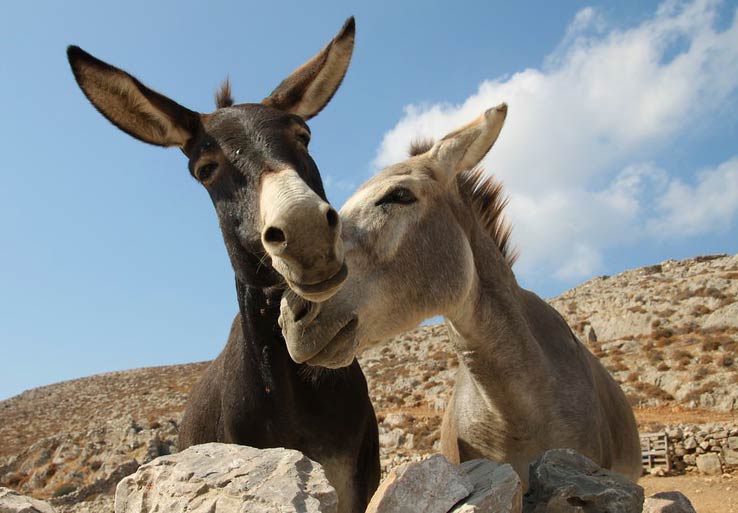
Donkeys also partake in pair bonding. Donkeys are not solitary animals, and this can be seen when they seek out a companion for themselves. When they find their companion, they grow close to each other and spend less time distanced.
i. Donkeys biting each other on the neck
Donkeys bite each other on the neck for a multitude of reasons. Pain, territoriality, play, and defense are some of them. Male donkeys might bite others to establish his dominance over them, but a mother donkey might just bite her foal to discipline them. They bite intruders and anything they perceive as a threat to dissuade them from coming into their territory. They bite to let you know that they are in pain and are uncomfortable. They also bite each other in fights and as self-defense.
For example, if a donkey is continuously biting another donkey’s neck with no intention of stopping, they might be frustrated with them and it’s a good idea to separate them but if it’s just a nip and they don’t do anything else, they’re just being playful.
How do donkeys behave when they are around other animals?
Donkeys being social animals love to explore and meet new animals and people, but they are also highly territorial animals who do not enjoy feeling like something is invading their territory. This makes introducing new animals to donkeys a challenging task.
If you’re introducing your donkey to any animal, it’s important to ensure that there is enough space and feed for the donkey to feel comfortable with sharing. Donkeys get along well with horses; they sometimes bond strongly with them and can feel their loss deeply when separated.
What about dogs, goats, and cats? Donkeys generally do not take well to dogs because they differ so greatly in their natures. Donkeys might hurt your dogs by kicking or stomping and therefore, donkeys may be dangerous to dogs. It is not advisable to keep them together.
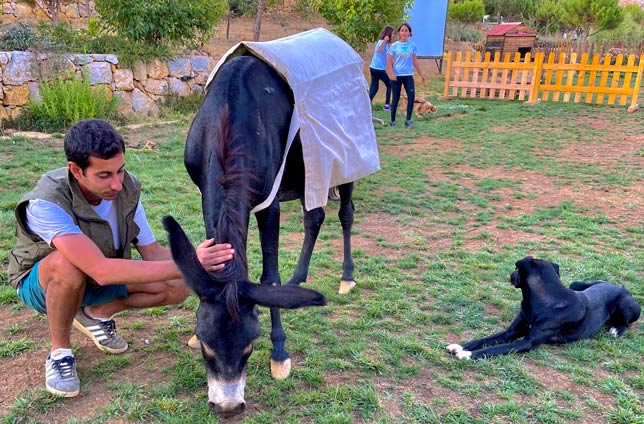
Donkeys are commonly used as guard animals for goats and other livestock. As mentioned before, donkeys are territorial animals and therefore might not be the best to house donkeys and goats together. But, depending on the donkey and how open they are to sharing their space, donkeys and goats can live together.
Cats are indifferent yet curious creatures and hence can get along with your donkeys, but they usually do not form strong bonds and they both may just go about their day not minding the other.
These behaviors are heavily dependent on how sociable your donkey is. Though donkeys are territorial animals, they are also sociable and loving. Since donkeys are usually used for labor-intensive work, it often leads to them being overworked and under-cared and developing trauma and distrust.
It might take longer for donkeys with such negative experiences to be comfortable with other animals but, depending on how sociable and territorial your donkey is they might get along with all sorts of animals and be friendly with them.
It’s also important to note that since donkeys are physically strong animals and partake in activities such as biting on the neck, they can sometimes unintentionally harm other animals. If donkeys perceive an animal to be a threat, they will most definitely behave aggressively towards them, they might even hurt them physically and therefore, it’s important to be modest in introducing them to new animals.
Donkeys as guard animals
Keeping donkeys as guard animals comes with its own set of challenges and advantages. Since donkeys are territorial animals, they are highly alert over which animal is coming into their territory. When properly bonded with the livestock they are guarding, they tend not only to be protective over the land on which they graze but also of the livestock they are protecting.
It’s important for donkeys to bond with the livestock they’re guarding, and this can be done by slowly introducing one another by keeping them close and keeping an eye on them. One of the best ways for donkeys to bond with other animals is when they grow up with them. This brings forward a sense of protectiveness and familiarity with the livestock.
Donkeys are popularly kept as guard animals in the US, Western Canada, and Australia. Donkeys have impressive eyesight and hearing, which lets them perceive threats and observe over expansive areas easily making them model guard animals. They also have loud brays which help them indicate other donkeys, livestock and humans of any dangers that might affect them. They often bray loudly when they sense an intrusion or a threat.
Keeping donkeys as guard animals is also beneficial to you as they are easy to maintain. They do not need separate feed and housing as they are herbivorous animals like livestock. They also live for 30-40 years, significantly more than dogs and so can protect your livestock for longer.
Rearing livestock also means protecting them from predators. Common predators in the USA for livestock include coyotes, and occasionally wolves. So being a livestock owner, you might question whether donkeys can really kill coyotes? The answer is yes. Donkeys will bray loudly to dissuade coyotes entering their territory and will kill them by biting or stomping with their hooves. They do the same with any other animal that may be intruding on their lands.
How smart are donkeys?
Donkeys are extremely intelligent animals. Being known for their ability to carry heavy loads over long distances and remembering the route for the same proves that they are intelligent animals but are perceived as dumb based on folklore and misconceptions.
Donkeys not only remember complex routes but also do not forget friends, family, and acquaintances, even if they have been separated for a while. Donkeys also imitate humans and learn from them. Take for example this video from Nat Geo Wild on YouTube.
You can clearly see in the video that Joplin the donkey has learned how to open and close doors and also knows exactly where the food is kept in the house. This displays their intelligence.
Donkeys are also highly self-preserving animals who will not make a decision that seems unsafe. In the face of any danger, they always firmly plant their feet and figure out a plan of action before making a move. This shows their ability to assess a situation before acting on it and great decision-making skills.
Why do donkeys roll in the dust?
Depending on the season, donkeys roll in the dust to cover themselves with a layer of dust to help them insulate and protect from extreme heat and cold. They also roll in the dirt to help scratch their backs. This also helps donkeys shed their winter coat in late spring.
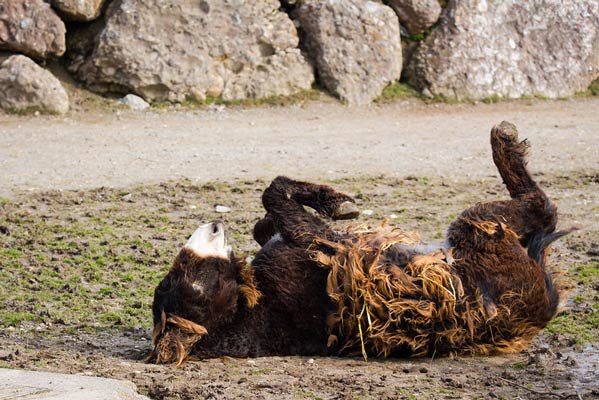
Donkeys often prepare a small patch as a dedicated rolling spot, and they do so by pawing at the ground to loosen the dirt. So, the next time you see your donkey pawing the ground, they might just be preparing to roll in it.
How do donkeys sleep?
When donkeys feel safe and comfortable, they sleep laying down on hay and if they’re uncomfortable, they will sleep lightly while standing up. Donkeys are diurnal animals and need to sleep for at least 3 hours a day with 30 minutes of REM sleep.
Donkeys sleep comfortably when they feel safe and protected and therefore ensuring a dry, warm, and well-stocked barn can be highly beneficial in helping your donkeys get the rest they need.
Conclusion
Understanding donkey behavior can be challenging due to the fact that donkey behavior is not as obvious as other animals. But donkeys are slightly shy and loveable animals, and therefore, love and understanding can go a long way in getting them to be responsive and open to you. Donkeys are intelligent creatures who do not make decisions that seem unsafe; therefore, a donkey’s trust plays a crucial role in any relationship you’d like to have. All donkeys come with their own set of quirks and behaviors but in a general setting, they are slightly reserved, social, affectionate animals who are intelligent and love to spend their time in warm areas with good food and water.
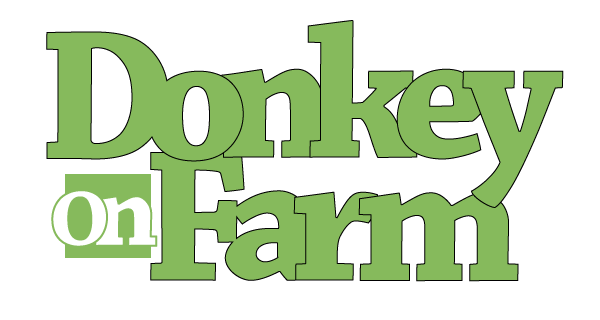
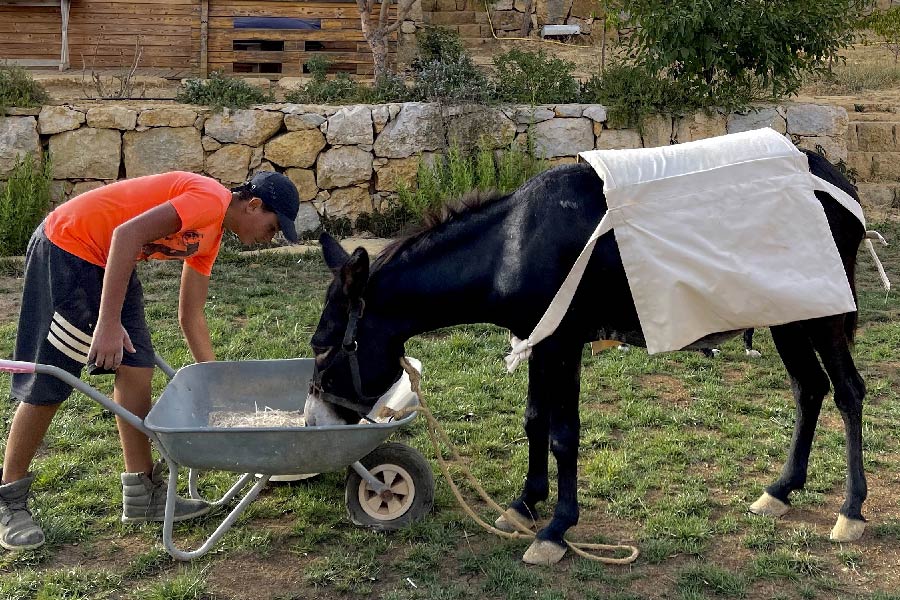

![Do Donkeys Laugh? [Plus Why Do They Do It?] do-donkeys-laugh](https://donkeyonfarm.com/wp-content/uploads/2022/08/Why-do-donkeys-laugh-270x180.jpg)
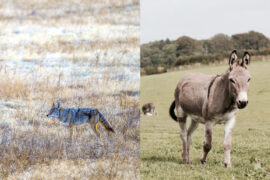
![Do Donkeys Make Good Pets? [Plus What to Know Before You Get One] Do-Donkeys-Make-Good-Pets](https://donkeyonfarm.com/wp-content/uploads/2022/05/Do-Donkeys-Make-Good-Pets-270x180.jpg)
![Are Donkeys Dangerous to Dogs? [Plus How to Keep Your Dog Safe] Are-Donkeys-Dangerous-to-Dogs](https://donkeyonfarm.com/wp-content/uploads/2022/07/Are-Donkeys-Dangerous-to-Dogs-270x180.jpg)